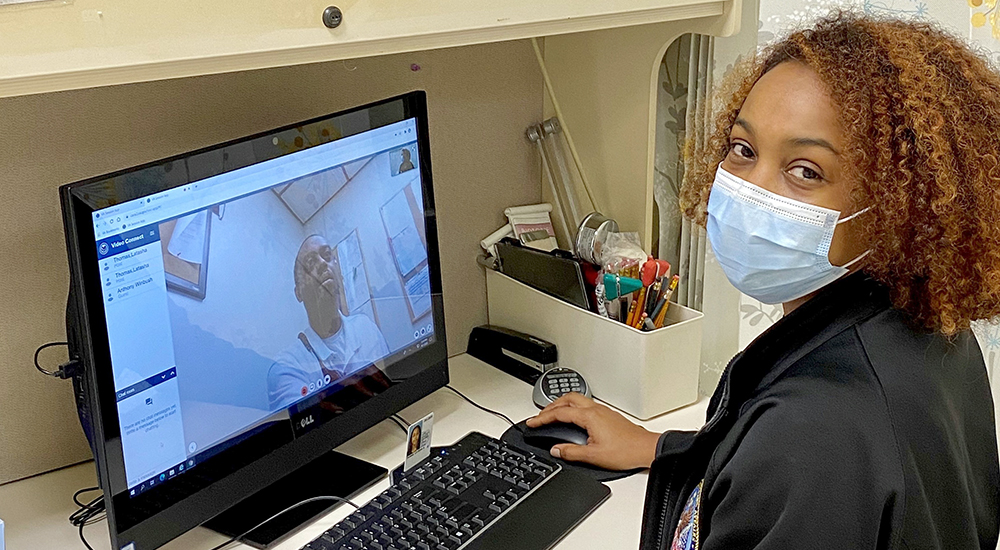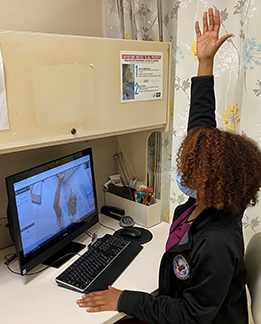Many Washington, D.C.-area Veterans and VA providers are realizing the benefits of using telehealth technology and VA Video Connect (VVC).
Physical therapist Dr. Latasha Thomas has converted most of her face-to-face appointments to telehealth. The results have impressed her.
“Initially, I assumed my patients would not be able to reap as many of the benefits as hands-on treatment. I feared they might not be consistent in the performance of their home exercise programs. Much to my surprise, Veteran patients have been motivated and consistent in completing follow up visits via telehealth.”
One of those patients, a retired colonel who spent 30 years in the Army as a Ranger, Jumpmaster and Pathfinder has numerous injuries that resulted in chronic pain and multiple operations. He was so impressed with Thomas and his tele-physical therapy that he wrote a letter to the medical center director, Michael Heimall.
(The Veteran asked that we not use his name as he wanted the focus to be on Thomas and telehealth, and not himself.)
Excerpt from his letter:
“Dr. Thomas is the best physical therapy person that I have ever seen and I have worked with physical therapy personnel in Germany, Australia, Canada and several hospitals in the United States.
“She is always pleasant and upbeat. Her expertise is very evident and she knows how to get the most out of me. She has been very proactive in sending me home exercise programs that are helping me recover from major back surgery. I find her sense of humor refreshing. She always remains the ultimate professional.
“She had two virtual sessions with me that really made me feel comfortable with my PT program. I hope you can let her continue to assist me in my recovery because I know that she is the best. Please pass on my admiration and appreciation to Dr. Thomas.”
Thomas says telehealth has the added benefit of allowing her to see inside the patient’s home and give her a keener insight into their world.
“I can meet the patients in their environment”
“One of the best parts of telehealth is that I can meet the patient in their environment,” Thomas said. “[I can] gain a better understanding of the challenges they face.”
Thomas also said that she misses being able to walk alongside her patients, but is thankful she can continue her work with Veterans in a productive and meaningful way.
“With telehealth, I am still able to connect with my patients and motivate them to take ownership of their health,” she continued. “I really enjoy seeing patients regain strength and functional mobility. I also see the impact a patient’s improvement has on reducing the burden of caregivers and families.”
Thomas knows she can’t eradicate every Veteran’s aches and pains, but she takes pride in knowing her expertise helps them to improve the quality of their lives while staying safe in their own homes.
“That is what wakes me up and keeps me coming to work every day.”
Telehealth appointments are on the rise and have positive outcomes. As a result, medical professionals encourage Veterans to learn more about telehealth. Speak with your VA provider to see if telehealth is right for you.
Topics in this story
More Stories
Veteran Byron Potier weighed almost 300 pounds and was tired and lethargic. He was the perfect candidate for gastric sleeve surgery.
How much do you know about VA care, benefits and services? Don’t miss out on what you've earned—check out the "2025 VA Federal Benefits Guide for Veterans, Dependents, Survivors, and Caregivers" handbook to learn more.
Feeling stressed? Your breath can help you relax and focus. Take 3 minutes to reset and prioritize your well being for this week's #LiveWholeHealth practice.








